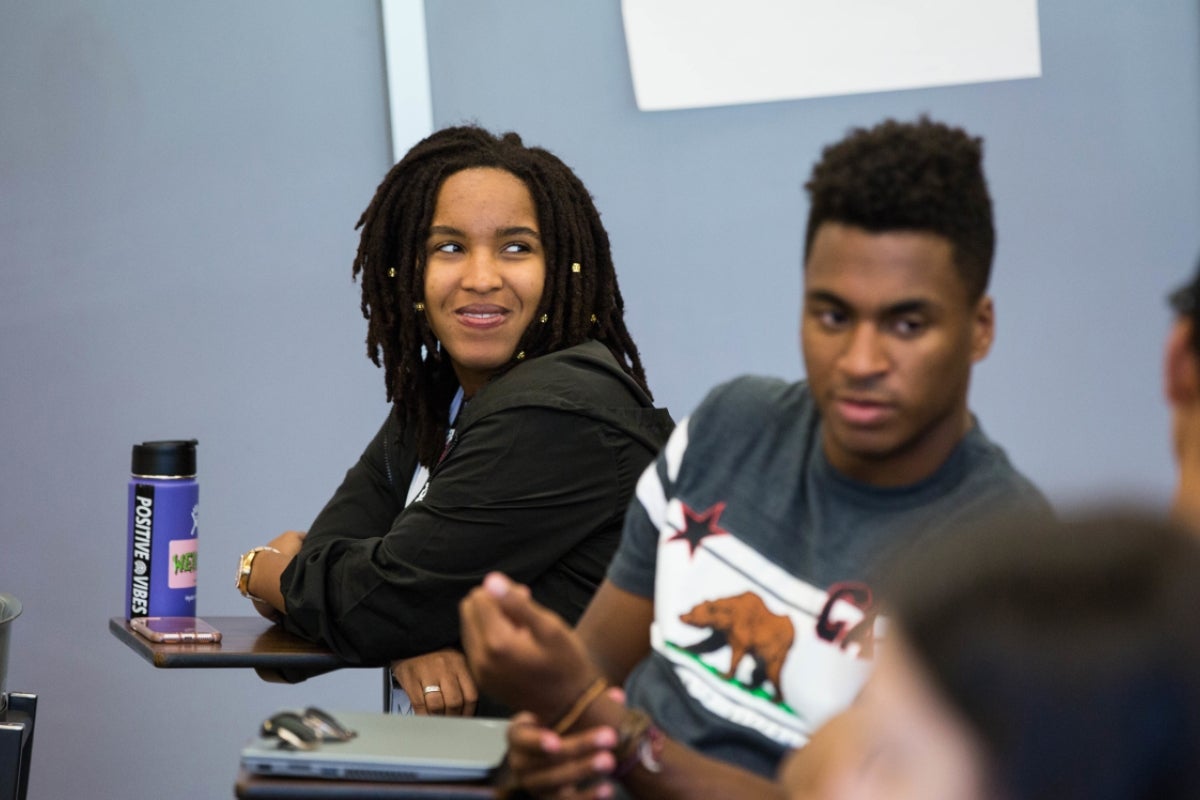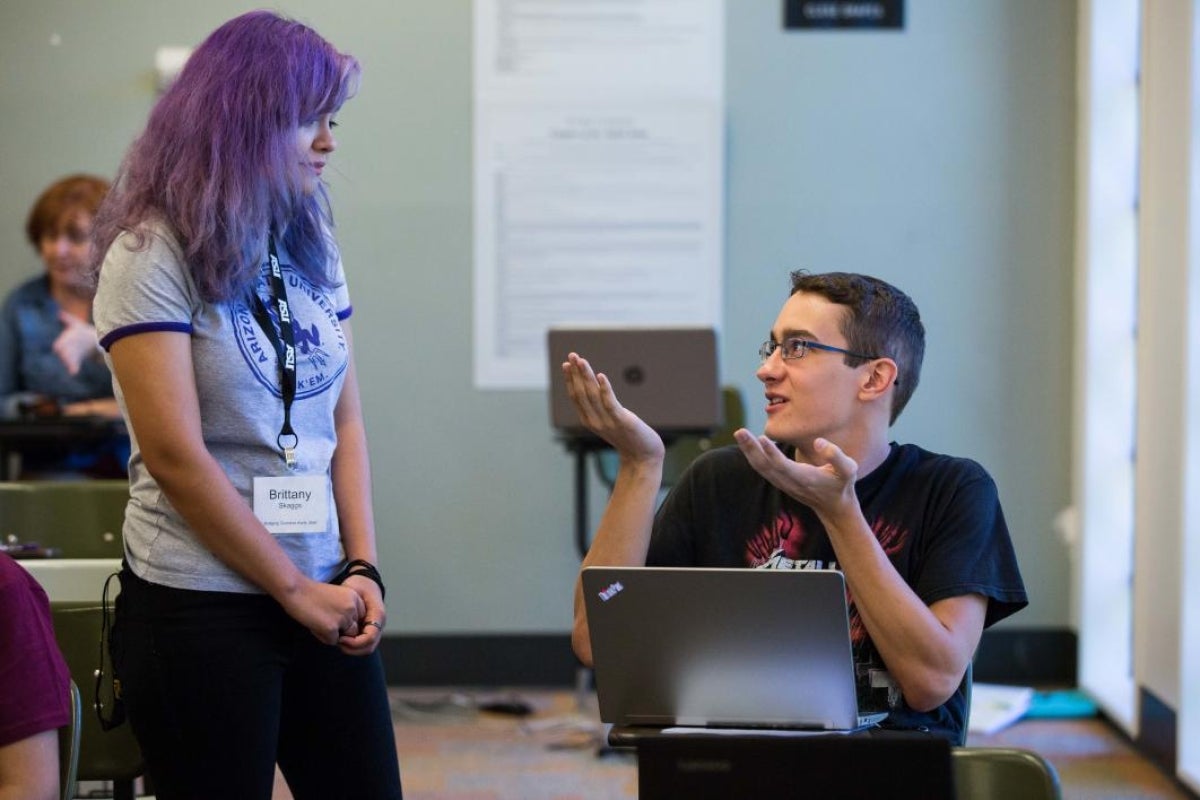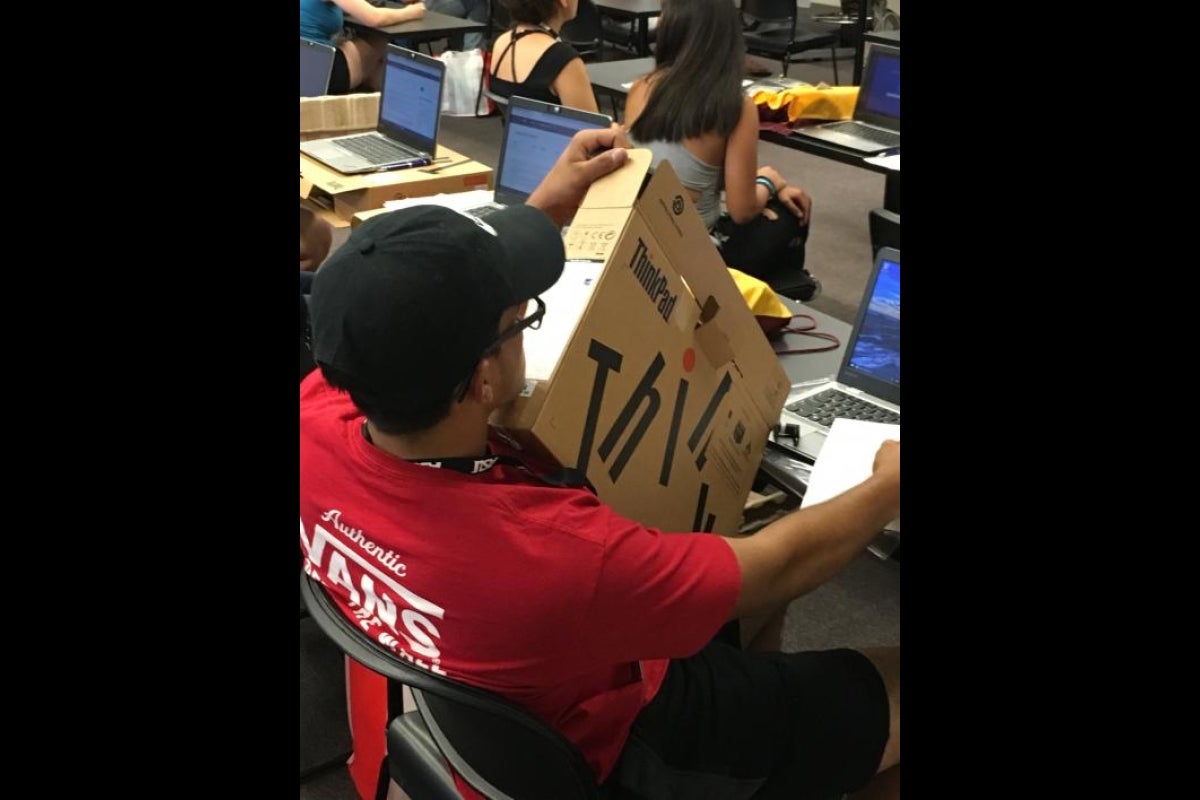Peer mentors jumpstart ASU transition for former foster youth

Bridging Success peer mentor Courtney Denton (center) a business law sophomore, talks to incoming freshmen Dawson Winslow (left) a biology major, and Kian Anderson, an exploratory student, as they explored the SunDevilSync site and researched potential ASU clubs and organizations to get involved with. Anderson said he’s looking into being a walk-on in track or cross country, and checking into intramural soccer and baseball.
Photo by Deanna Dent/ASU Now
Editor's note: Thirty new ASU freshmen and transfer students who started classes at the university last week took advantage of Bridging Success Early-Start. The six-day residential transition to college program, held Aug. 6–11, helps welcome alumni of foster care to the university and prepares them for success in their first–semester and beyond. ASU Now sat in on several afternoons of the program to get an inside look at the Early-Start experience and some of the ways that peer mentors help new students’ confidence unfold.
What was most challenging for you about starting college?
What do you know now that you wish you’d known right from the start?
As ASU junior Cynthia Alaffa and sophomores Courtney Denton and Brittany Skaggs gave honest answers to these questions, as part of an opening panel for ASU’s Bridging Success Early-Start program, their audience in the Alumni Lounge of ASU’s Memorial Union grew exceptionally attentive.
The three, who would serve as peer mentors and program assistants throughout the six-day program, had up to now largely blended in with the new-student cohort, save for their maroon Bridging Success t-shirts and their social ease going from table to table to greet each of the participants. But from this panel forward, their role as trusted advisors was solidified.
Skaggs, a psychology major, commented first. She shared that all the paperwork to declare legal independence when she joined ASU and moving into a residence hall on her own was hard, as was learning to ask for help generally.
“Reaching out and asking for help is something that took me a while to do,” she admitted. “I’d struggle and struggle on my own, and then I’d finally ask for help and the problem would be solved so quickly. I learned not to wait.
“Don’t be afraid to open up and make friends,” Skaggs also advised. “I’ve gotten to know people in the last year who are now better friends than some I’ve known since fifth grade.”
Alaffa talked about the difficulty of not having the family she had grown up with around for support.
“When I started at ASU, my aunt, who was my guardian, had just moved to California and I had moved in with a cousin, so part of my support system was gone. I wish I would’ve known the importance of using networks,” said the social work major. “I kind of secluded myself at first and didn’t have a balance between schoolwork and social. Finding a support system through Bridging Success and the Nina Scholars Program really helped.”
Denton encouraged the new students to keep their minds open. “When I got here I kind of had a hard heart, you know what I mean? I thought I’d experienced everyone. Keep your mind open about people,” suggested the business law major. “Even people who didn’t experience the kinds of things we have are struggling to be here.”
She shared that while she’s always been really independent, being organized was not her strong suit: “Tutoring centers really helped,” she noted. “I should’ve set up a tent, I went there so much. It’s not like in high school, where there might be stigma for using tutors. At ASU, everybody goes. Students are just a little older than you, and it’s like talking to a friend.”
“Getting insights like these from near-peers can be reassuring to any student who has jitters about starting college,” observed social work master’s student Kalah Polsean, the ASU University College management intern who helped organize and led the week of Early-Start activities. “For students who may not have much extended family support, seeing how other students have made it through foster care and to college can be encouraging.”
At the end of the panel session, students were invited to ask the peer mentors anything that might be on their minds. They were quiet at first, but then the questions came:
“What are the most important things to bring to the dorm?” (Toilet paper and medicine cabinet stuff that you take for granted will be there at home.)
“Will we use more hangers or will we put most things in a dresser?” (It depends. Wait to buy a lot of things until you really know your space and what will work.)
“Did you have a student job?” (Peer mentors and staff recommended working on campus, but waiting at least a semester if possible, and they explained the nuts and bolts of Work Study positions.)
Real, relevant, and valid
Early-Start accounts for a big part of the responsibilities of students who sign on for the peer mentor role with Bridging Success, explained program coordinator Justine Cheung, who is also a doctoral student in social work and a foster mom herself. But mentors also provide ongoing support to students throughout the year.
“They are a trusted resource for the students when addressing barriers because they have a wealth of information based on their lived experiences here at ASU,” Cheung said. “A lot of times students just need to talk to someone who has been through what they are facing.”
The peer mentors also play a key role in the program’s community outreach.
“The peer mentors can speak truth to youth in care and to adult caregivers about what it takes to get to college and assure them that it is 100 percent doable. Again, hearing it from someone who has walked the path before them makes it feel much more achievable," Cheung emphasized. “They see that aspiring to go to college is a valid goal.”
Peer mentors receive a $1,000 scholarship for their efforts.
ASU launched its Bridging Success year-round support program and its Early-Start component for new students in 2015, in response to Arizona legislation that waives tuition for youth who were in foster care at age 16.
The university’s College of Public Service and Community Solutions oversees the year-round program, and University College coordinates Early-Start.
“Similar programs have been growing around the country to target the needs of this student population, but not much research has been done on the validity of the content,” observed University College director of community outreach Jeanne Hanrahan, principal investigator for the Bridging Success Early-Start grant project, which received support in 2017 from The Arizona Foundation / Women in Philanthropy and the ASU Sun Devil Family Association.
But ASU is different, and a leader in this regard, she noted.
The Bridging Success team captures and analyzes quantitative and qualitative data from each cohort and makes programmatic changes in response to the data. They share their findings nationally in social science journals; their most recent article appeared in the July 2017 issue of the Journal of Social Service Research.
“In terms of our research, fall to fall retention data from first to second year is consistently 10 percent higher for entering, former foster youth who participate in Bridging Success Early-Start compared to those who do not,” Hanrahan said.
“In evaluations, students have expressed again and again the importance of making friends and feeling connected to others as one of the most important takeaways of the program,” she said, “which is why we continue to expand the role of peer mentors and involve other ASU Bridging Success students and alumni in Early-Start, to create overlap among cohorts right away.”
What does being a student look like at ASU?
Faculty and administrators from across ASU as well as community supporters get involved in welcoming and orienting Bridging Success students.
This year Duane Roen, dean of University College, formally welcomed students. Professor Karen Leong, from the School of Social Transformation, presented a mock class session and tips for being successful in lecture-based courses. From the College of Integrative Sciences and Arts, Mary Dawes, director of academic and career exploration, guided students through the fun Me3 career quiz, and English instructor Shillana Sanchez gave students a taste of First-Year Composition and helped them dissect a syllabus.
Representatives from ASU’s Counseling and Financial Aid offices spent several hours with students, conducting presentations and informal workshops, and students visited math centers, tutoring and writing centers, and libraries.
Debbie Hall and colleagues from Tempe-based Insight donated laptops to Early-Start participants and helped them get those set up before the end of their first day in the program. Later in the week Naketa Ross, founder of ResilientMe and a foster alum herself, led sessions focused on embracing responsibility and learning to be interdependent — engaging with others to achieve success.
On the third day of Early-Start, Alonzo “AJ” Jones, ASU associate athletic director for inclusion and championship life, led a wide-ranging session to get students thinking about their student selves and their social selves and the role that preparedness and enthusiasm play in success.
“What does being a student look like? You have to put in the time, about 25 hours a week on top of class time, which still gives you about 80 hours of awake time to do what you want to do,” Jones observed. “It could be rugged at first, but eventually you’ll achieve kind of a ‘scholars’ high.’ You’ll realize, hey, I’m an intellectual. I’m in a student groove.
“You’re at a new beginning! You can bring in what you want of yourself from high school and walk in with some intentionality and pre-thinking,” he advised. “Think about how you can complement your studies with organizations that can give you a home away from home and experiences that will contribute to your preparation for life — not just at age 19 but you at 49, 79.”
After his session, each of the Bridging Success peer mentors talked about how getting involved with student organizations has added to their ASU experience, helping them to make friends and gain a greater sense of purpose and value.
As students then researched at least three groups they might want to look into joining, peer mentors went around the room to answer questions as students perused the Sun Devil OrgSync site, a one-stop site to learn about the more than 1,000 clubs and organizations at ASU.
Five days in: Confidence, connection
On the last full day of Bridging Success Early-Start programming, the focus was on resiliency: what science tells us about how to develop it as well as exercises and discussion to help students see the ways they can tap into their own stories.
Polsean asked students to work as teams to pool knowledge and brainstorm recommendations for each other about strategies that could help them make a good start to the year.
“Even through you’re worried about these new challenges, you’ve done these things before. You have so many skills already that you’ve practiced at other times in your life,” Polsean reminded participants, after they shared some super practical ideas for how to be organized, how to learn a new campus, and things to remember when taking tests and writing papers.
The exercise set the stage for the research presentation by social work professor Cynthia Lietz, principal investigator for the Bridging Success program and senior associate dean of the College of Public Service and Community Solutions, and ASU junior Breanna Carpenter, a social work major who was in the first Bridging Success Early-Start cohort.
Lietz and Carpenter engaged students in a discussion of 10 protective factors that empirical research shows support resiliency: social support, insight, creativity/flexibility, initiative, commitment, humor, communication, boundary setting, morality/spirituality, and appraisal.
Students talked insightfully about ways they’d drawn on these coping practices: “I grew up around bad influences, but I don’t practice any of them” (boundary setting); “I didn’t grow up that well but could laugh about situations” (humor); “I felt safer at school and built a sense of belonging there” (social support).
“Our risk factors don’t determine us, and plowing through can make us stronger. I know that challenges in my life have made me who I am today. I’m glad of who I am and the part they played in my story. I wouldn’t want to take that out of my experience,” Lietz shared about her own life.
As a takeaway, she asked students to remember “We cannot and should not put an upper limit on what someone is capable of — instead, embrace what’s possible.”
Talking with students at the end of that afternoon about changes they saw in themselves over the week of Early-Start was revealing.
“That first day, honestly, I was kind of terrified,” freshman Emily Rose Vanbenschoten recalled. “I knew by the time I was about five years old that I wanted to go to college,” says the computer science major, who was legally independent and living on her own well before graduating from high school. “But the reality that college was happening for me didn’t hit me until I set foot on campus. Suddenly it was present tense; that’s a bit of a mental shift.
“Now I feel so much better! I have friends!” she exclaimed with joy and confidence, as she turned to her side and shared a laugh and fist bump with fellow Bridging Success participant Mona Artis. “I’m feeling so prepared and grateful to be part of a caring, supportive group.”
Artis, who is majoring in journalism and transferred to ASU from GateWay Community College, said she came into the program wondering about how things will work at ASU and whether it’d be more difficult academically.
“This program was like having VIP access to all the resources ASU has to offer! I feel equipped and a bit more confident,” she explained. “Though the program is built around the needs of new freshmen, I got to review some things, and I got to know the Tempe campus, which I wasn’t as familiar with as Downtown.”
Did the peer mentors play a big part in that?
“The peer mentors were great! They are in the middle between an adult and a peer like you. The experience makes me want to be that peer mentor next year who helps somebody else out,”
Kian Anderson, an exploratory freshman interested in kinesiology, said he went into the Early-Start experience without really having expectations.
“I was hesitant and a little shy at first but then enjoyed participating in all the discussion, and I really connected with my suite mate. Understanding that we have this supportive community and connections, it’s made me even more excited to start classes.
“I know the workload will be tough, but balancing that is what makes the best memories,” reflected Anderson, who as a student at Flagstaff’s Coconino High School juggled dual enrollment and AP classes, sports, a part-time job, and home life. “It was hard, but the challenge made it a good time.”
Anderson was pumped that the night before he had gotten a ticket through devil2devil (a private social networking tool for incoming Sun Devils) to go with some other students to the Diamondbacks’ game — his first.
“I’m super excited for the nightlife of a big city. That was amazing,” he marveled. “I actually already feel like I belong here.”
ASU invites (and encourages) any enrolled students who self-identify as alumni of foster care — whether they’re new freshmen, transfer students, or continuing students at any level — to connect with the Bridging Success programs and community by contacting program coordinator Justine.Cheung@asu.edu in the School of Social Work.
More Sun Devil community

A champion's gift: Donation from former Sun Devil helps renovate softball stadium
Jackie Vasquez-Lapan can hear the words today as clearly as she did 17 years ago.In 2008, Vasquez-Lapan was an outfielder on…

Student-led business organization celebrates community, Indigenous heritage
ASU has seen significant growth in Native American student enrollment in recent years. And yet, Native American students make up…

Remembering ASU physical chemist Andrew Chizmeshya
Andrew Chizmeshya, a computational chemist and materials scientist whose work spanned over three decades at Arizona State…






